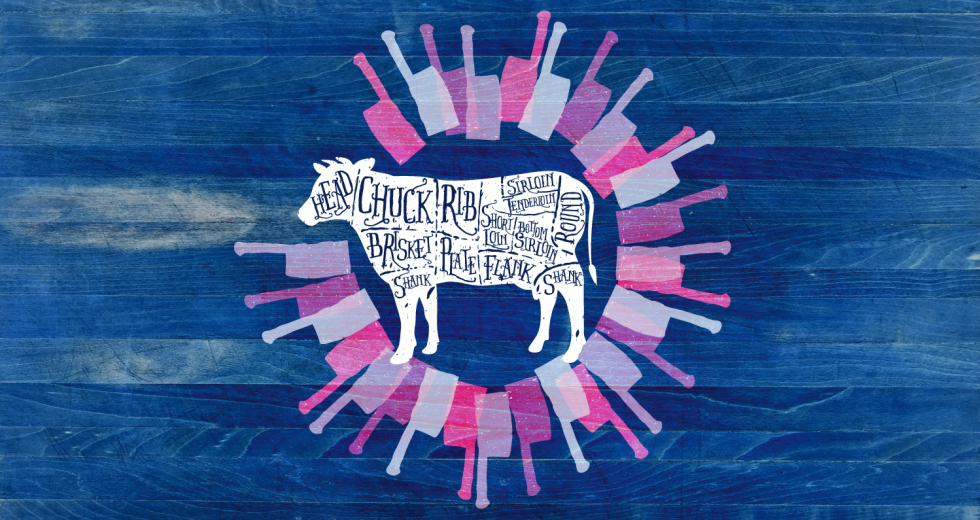Walking into V. Miller Meats in East Sacramento is not unlike stepping back in time. The clean white walls and cuts of meat showcased behind spotless glass cases recall a time before hamburger to go became a normal thing, and imposing walls of bloodied styrofoam plates dominated the meat section of the local grocery.
A few months before the National Restaurant Association named artisan butchery and “new” cuts of meat among their top 20 food trends for 2016, Eric Veldman-Miller and Matt Azevedo opened a shop on the corner of 48th and Folsom streets, with the intent to serve locals with something new — in a way that is actually very old.
Veldman-Miller says he believes the idea of a modern butcher shop plays a lot on childhood memories. “We’re doing something unique, but it’s not new,” he says. “Your parents and grandparents cooked these things.”
By “these things,” Veldman-Miller means some pretty unusual offerings. Because the shop works with farmers who supply whole animals, every bit of the hog, cow or sheep gets used — every part.
“We can’t keep oxtail in the store,” he says with a laugh. Other odds and ends you might find include pig kidneys, beef heart, beef tongue, and something called a “Sunday Sauce,” which actually sounds pretty delicious when Azevedo describes it: Something not unlike the rich meaty base of a good chili or hearty stew.
Another popular cut is offal, or the internal organs and entrails of the animals. “We see a lot of people ask for it and we show it to them and they’re like, ‘Ohhhhhh… no we don’t want that.’” Veldman-Miller says, laughing. “I still think there’s a pretty good stigma.” He says it probably “has to do with horrible childhood memories. But people are getting much more adventurous.
V. Miller Meats employee and fellow butcher Cindy Garcia says it’s because they have the “whole animal to play with” that they’re able to give customers such unique offerings. “Come talk to us,” Garcia says. “We can help you pick out what you need and teach you. It’s not all rib eye; there’s a lot of hidden gems.” Veldman-Miller says it’s that sort of personal attention people aren’t used to getting from the meat counter at a supermarket.
“We’re there to give cooking advice, we’re there to help people with a special meal for the week,” he says. “Part of our job as a butcher is to educate our customers with what they want to cook, what they want to eat.”
Still, when they opened shop in November of last year, Veldman-Miller says the team was nervous. “We opened the doors and were like, ‘Man, I hope this works.’” But he says the reception from neighbors and the community was “humbling.” He jokes that someone even brought them some jam to welcome them to the neighborhood.
Customer and Midtown resident Abby Serin came into the shop one evening recently with her 3-year-old daughter Eliza to buy bones so that she could make bone broth for the first time. Eliza excitedly pointed out something she recognized in the glass case to her mom: Sausages. “We’ve been anxiously awaiting for this shop to open,” Serin says. You can’t get bones like the ones Serin was buying from V. Miller at a regular supermarket, Garcia explained. Once again, it comes back to the artisan butchery sourcing whole animals from local farmers.
“It’s more and more difficult for the average customer to have that connection [to their food],” says Azevedo. “The number one ethos of our shop is to reconnect people to their food source. Laws are being passed to make it rare and more difficult to find out where it even comes from.” It was common to know where your food came from 100 years ago, he says, but not anymore.
Veldman-Miller says he’s “particularly proud” of being able to bring unique cuts of meat to East Sacramento, and that’s he’s particularly fortunate to be partnering with local farmers like Rancho Llano Seco in Chico for their pork, Chowdown Farms in Yolo County for humanely-raised chicken and Stemple Creek Ranch in Marin County for grass-fed lamb and beef.
“What they do feeds what we do,” he says.



